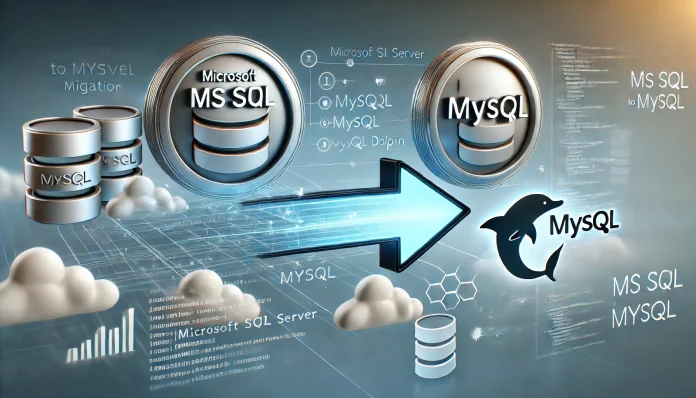Comparing MS SQL Server and MySQL directly isn’t always meaningful, as both database management systems are capable of supporting robust, reliable, and efficient data warehouses. The overall performance and effectiveness of a database often depend more on the expertise of the administrators and developers managing it rather than the system itself. Each platform has its own strengths and weaknesses, making the choice between them highly dependent on specific project requirements. However, many organizations have chosen to migrate from SQL Server to MySQL, largely due to MySQL’s open-source nature, cross-platform compatibility, and seamless integration with web-based applications.
Why migrate to MySQL?
Open-source software is increasingly proving to be a strong competitor to proprietary solutions. MySQL, as one of leading open-source database management systems, has emerged as a viable alternative to commercial platforms like SQL Server, thanks to its distinct advantages.
Cost Savings
MS SQL Server requires expensive licensing fees (e.g., Enterprise Edition costs around $7,000 per core). MySQL is open-source and free (except for MySQL Enterprise Edition). For businesses and non-commercial organizations, it means the saved budget can be spent on another purposes of IT infrastructure.
Scalability & Performance
MS SQL Server scales vertically (adding more CPU/RAM to a single server). MySQL scales horizontally (better suited for distributed databases and sharding). High Availability (HA) and Replication are easier to configure in MySQL.
MS SQL is optimized for transaction-heavy workloads (OLTP), but not always for high-read operations. MySQL uses MyISAM and InnoDB storage engines, optimized for fast SELECT queries. Besides, it is owned by Oracle that brings corporate standards of high quality into the products development.
E-commerce websites (Shopify, WooCommerce) use MySQL because it’s fast for handling millions of product views per second.
Transparency of Open-source
Any developer can always find out how the code is working due to direct access the source code. It enables unlimited tuning and improving the entire MySQL DBMS. Also, it allows port the code to new platform and update it to changing configuration of an existing system.
Cross-Platform & Cloud Compatibility
MS SQL Server runs best on Windows, while MySQL is cross-platform (Linux, macOS, Windows). MySQL is better optimized for cloud platforms (AWS, GCP, Azure, DigitalOcean). Many cloud-native applications are built using LAMP (Linux, Apache, MySQL, PHP/Python) stacks.
Challenges of Migration
MS SQL to MySQL migration comes with several challenges that require careful planning. One of the major bottlenecks is stored procedure and trigger conversion since MS SQL uses T-SQL, while MySQL has its own procedural language. This often means rewriting complex business logic manually.
Another key challenge is schema differences, such as data types and constraints. MS SQL supports unique types like NVARCHAR(MAX), while MySQL has stricter length requirements for TEXT fields. Indexing strategies also differ, which can impact performance after migration.
Transactions and ACID compliance present another issue of MS SQL to MySQL migration. While MS SQL enforces strong transactional integrity, MySQL’s behavior depends on the storage engine—InnoDB is required for full ACID support, but other engines may not offer the same guarantees.
Performance tuning must also be reconsidered, especially for query optimization and indexing. MS SQL has advanced optimization features like indexed views and execution plans that don’t directly translate to MySQL. Query execution in MySQL often requires additional tweaking, especially for complex joins and subqueries.
Authentication and security models also differ. MS SQL integrates seamlessly with Active Directory, whereas MySQL requires manual user and privilege management. Migrating user accounts, roles, and permissions can be tedious.
Additionally, replication and high availability strategies need adjustments. MS SQL Server has built-in AlwaysOn availability groups, but MySQL replication requires configuring master-slave or clustering setups, which may not behave exactly the same.
Finally, application-level compatibility is a concern. If an application was designed to leverage MS SQL-specific features like XML processing or full-text search, those functionalities may need alternative implementations in MySQL.
Tools for Migration
Migration from MS SQL to MySQL can be complicated and requires deep knowledge of both source and destination DBMS, especially for large corporate databases. In order to avoid data loss or breaking integrity due to human factor, it is recommended to use special tools designed to simplify the database conversion procedure.
Intelligent Converters, a software company specializing in database conversion, migration and synchronization since 2001, developed such a tools for MS SQL to MySQL migration. The product called MSSQL-to-MySQL automates database migration from SQL Server or Azure SQL to MySQL, MariaDB or Percona. Easy to use intuitive interface allows to pass through the entire process with just a few clicks of mouse button.
The product supports all versions of Microsoft SQL Server including Azure SQL and all versions of MySQL running on Linux/Unix/Windows platforms (including such variations as MariaDB and Percona). It migrates table definitions (DDL), data, indexes, constraints and views. Stored procedures and triggers are not supported.
Other Features of MSSQL-to-MySQL
- Option to convert SQL Server database into MySQL script file
- Option to customize resulting table structure
- Stores conversion settings into profile
- Option to filter data using SELECT-queries
- Option to sync MySQL database with SQL Server data
- Command line support allows to script and schedule the migration process
- Easy-to-use wizard-style interface
As every software product of Intelligent Converters, MSSQL-to-MySQL comes with free demo version, 1-year subscription for updates and unlimited support. Demo version allows to convert not more than 50 rows per table, and it does not convert foreign keys and views.
Conclusion
MS SQL to MySQL migration is reasonable if:
- you want to eliminate licensing costs
- you need cross-platform and cloud flexibility
- you run web apps, e-commerce, or SaaS (MySQL performs better)
- you need fast read-heavy workloads
Stay with MS SQL if:
- you use heavy stored procedures, reporting (SSRS), or complex analytics
- you need stronger OLTP & ACID compliance
- you are already deeply integrated into Microsoft tools
Use special software like MSSQL-to-MySQL for seamless migration ensuring to preserve data integrity and avoiding risk of data loss or corruption.








